There are a number of indicators that Monero usage is growing.
For example, the chart below shows quarterly transaction volume since 2016:
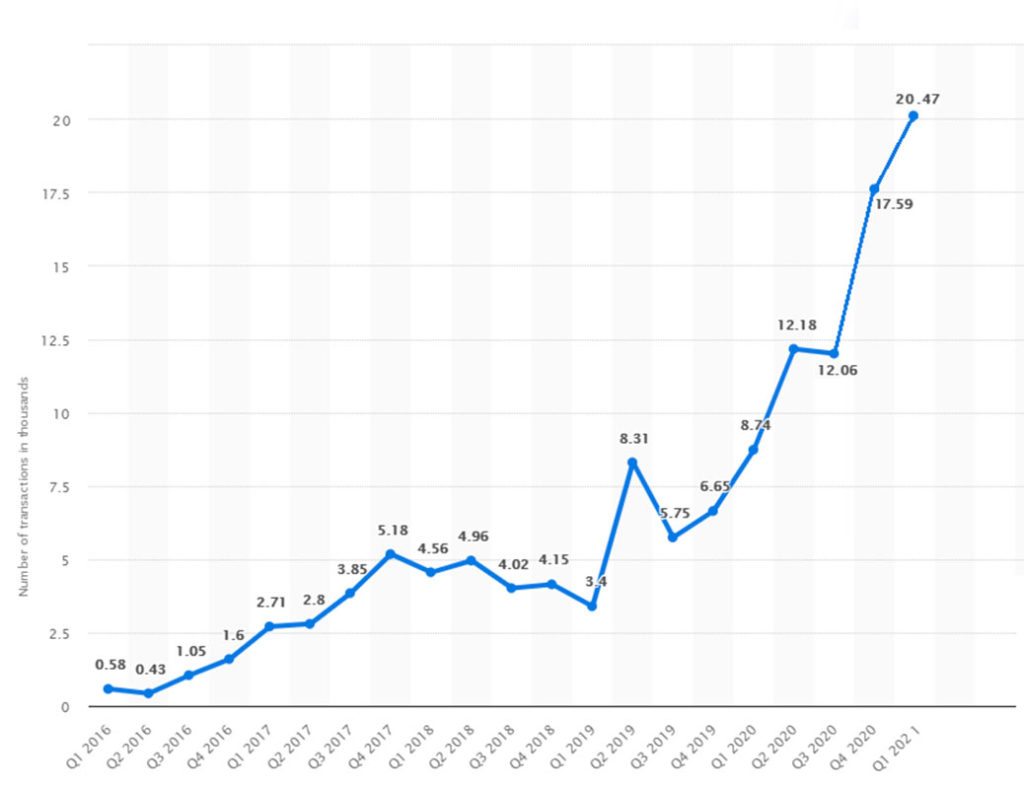
Another data point we have is the growth in usage of a popular mobile Monero focused wallet called CakeWallet. After launching in 2018, it took until December 2020 before they reached 60,000 installs (source), then just 4 months later, they reached 100,000 installs (source).
Part of this could have been to do with them adding Bitcoin support in Jan 2021 – but that probably isn’t the whole story.

Based on the above data points – Monero certainly seems to be growing.
In this blog post we’re going to look specifically at the nascent field of “digital privacy”, how it’s also growing, and how Monero might be affected by this.
14 years ago there was very little concept of “digital privacy”.
In part, because the digital world was still being created. There was no iPhone, no Instagram, Whatsapp, or Twitter. Smartphones and social networks were still in their infancy.
Back then our phones weren’t tracking our every movement, and there was no United States PRISM surveillance program.
Back then many of us would voluntarily give our personal information to online services, naive to how it may later get used (and leaked).
However, in the years since, we’re globally starting to wake up to the need to protect our digital privacy.
Below we’ll look at some metrics we can use to gauge the growth of digital privacy.
Metrics
Whilst it’s not easy to reach into the global hive mind and measure exactly how their perception of digital privacy is changing, we can at least fumble around with some basic metrics to give us an idea.
Subreddits
As readers may already know, Reddit.com is the most popular message board globally. At the time of writing, it’s ranked #19 most popular site globally, and #7 in USA (via Alexa.com). It comprises of “subreddits”, which are topic focused message boards. A number of them are privacy focused, and so measuring their growth over time is interesting. Data comes via subredditstats.com.
Below you can see below the growth in subscribers (blue line) of the subreddit /r/privacy. Growing approximately 8x since Jan 2018.
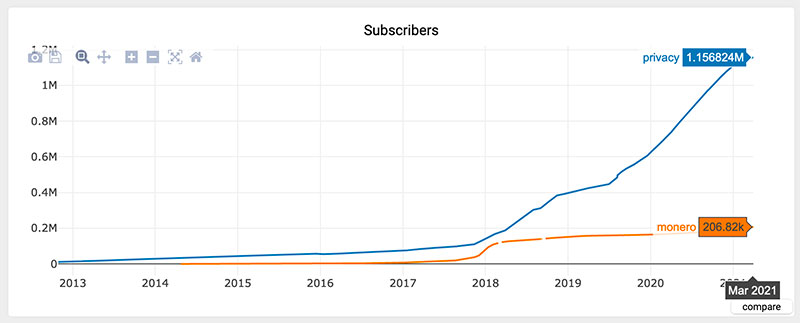
Similarly, we can see that the subreddit growth for PrivacyToolsIO and Signal Messenger are growing rapidly also:
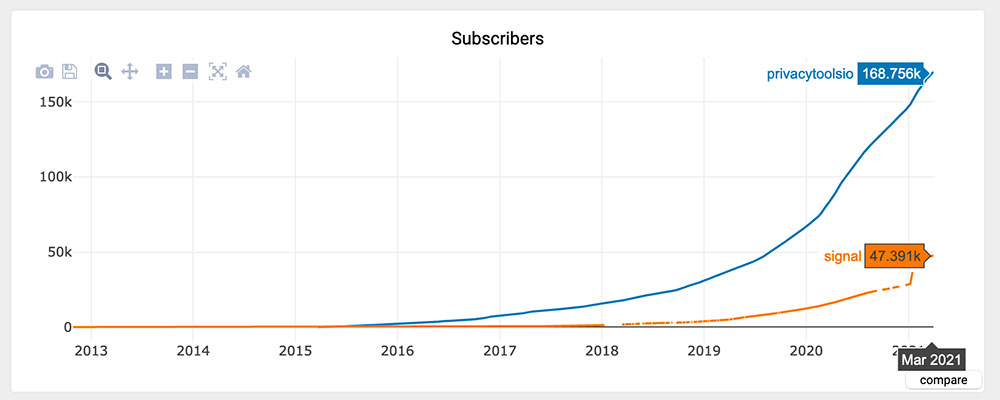
Users of these subreddits are actively engaged in learning and talking about privacy related technology. They’re likely to be “early adopters”.
Private Search Engines
Whilst there are a growing number of privacy focused search engines, the most well known one is DuckDuckGo. They openly share the number of daily queries here. Since 2018 this has gone up around 4.5x.
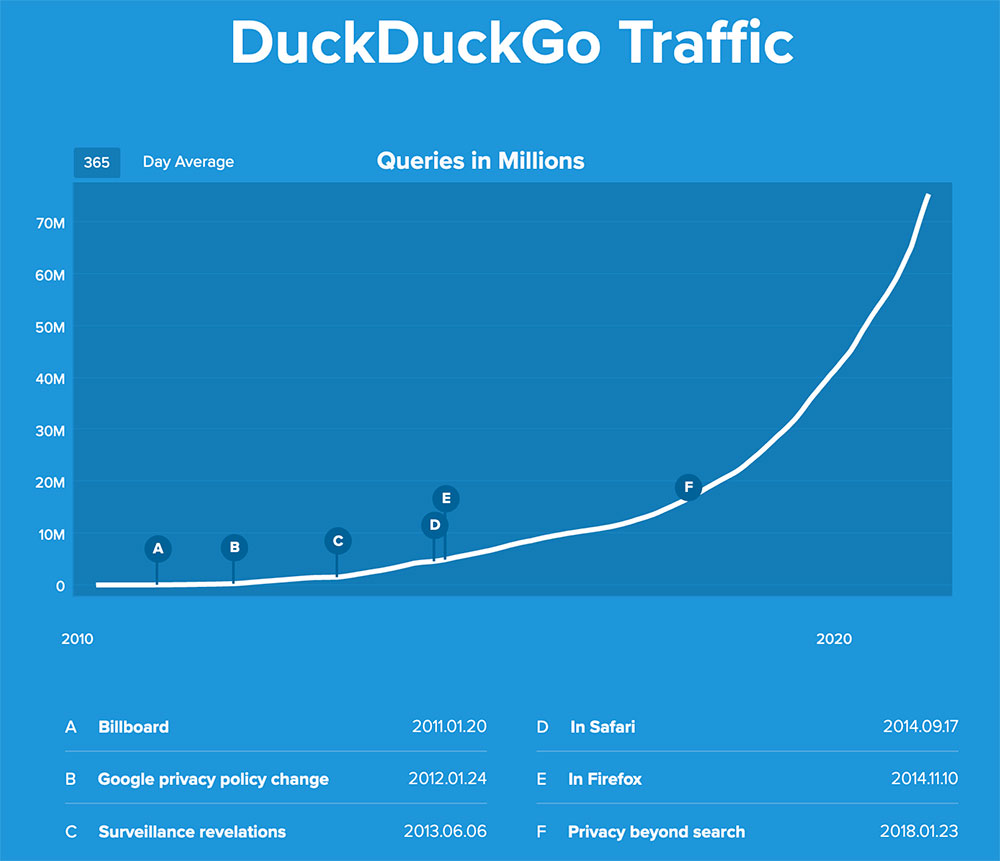
Other
Whilst the subreddit and duckduckgo growth are the cleanest, most reliable metrics I can find. There are other sources that point in a similar direction:
- 1Password, the password manager tool that helps people store and use unique complex passwords for their web logins, reported that since hiring a CEO in 2012, they’ve gone from 20 to 174 employees (Nov 2019 source).
- Tutanota, the privacy focused email service, wrote in 2017 that they were globally ranked #35,515 for traffic (via Alexa). At the time of writing they’re globally ranked #24,665, showing a big improvement.
- Signal Messenger, which uses end to end encryption for message content, recently surged in popularity, after Whatsapp announced they would start sharing data with Facebook in North America. Causing Signal to temporarily shoot to the top of download charts.
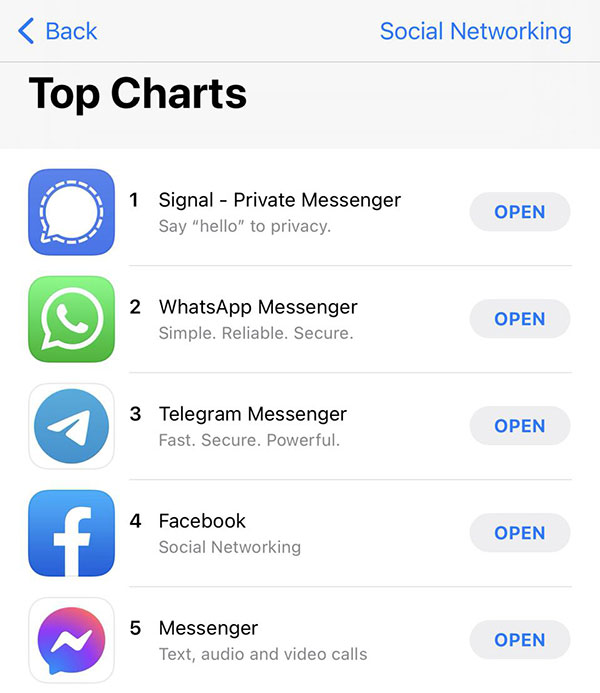
Privacy in Popular Culture
The Social Dilemma
If you said a couple years ago that Netflix would release a documentary that touches on the privacy issues around social media, and it would notch up more than 38 million views – I’d have been surprised. But indeed, that’s what’s happened with The Social Dilemma – when it was released on Netflix in early 2020.
It looks at the way social media companies use our data to help manipulate us into doing things they want – such as spending more time on their platforms so they can show more ads.

Apple on Privacy
Apple, currently the largest company in the world by market cap, is running ads talking about privacy.
It has clearly made a bet that people will buy their products if they associate them with privacy.
Below are 4 examples of their privacy focused ads.
Privacy Growth Roundup
As we can see from the charts above, the global interest in digital privacy is increasing rapidly.
The charts suggest that somewhere between 2015 and 2018 things picked up speed.
This growth trend is likely to spur more growth, in at least 3 ways:
- More users = better products. Increased real-world product testing, product feedback and feature requests will lead to improved products that are more attractive to existing and potential new users.
- More users = more money (assuming the product has a revenue model). More money provides an incentive to keep improving products. It’s also likely to foster new product competition, from entrepreneurs who want a piece of the growing pie. In turn, increasing the range and quality of the products users have access to. Better products = a stronger carrot to lure users away from their existing products to privacy preserving products.
- More users = more education. As more people learn and use privacy preserving products, they’re then more likely to go on and spread that knowledge with people in their social network. Education is a large piece of the puzzle.
How Might This Affect Monero?
Whilst the above products mentioned all play a role in protecting digital privacy, none of them specifically address the issue of financial privacy.
Monero currently sits atop a very short list of digitally native currencies that preserve user’s privacy.
Right now, the people aware of Monero either come across it because they really need it, or because they’re interested in cryptocurrencies and hear of it that way.
However, as we can see, digital privacy awareness is growing, and it’s plausible that a small percentage of these people will, in time, come across Monero and realize it’s impressive utility.
Whilst it’s unclear how that translates numerically to Monero’s growth, it seems Monero is well positioned to benefit from the growth in the sector.

Roundup
Hopefully the article was helpful in terms of the research around digital privacy growth.
If you have any questions or comments, please leave them below.



